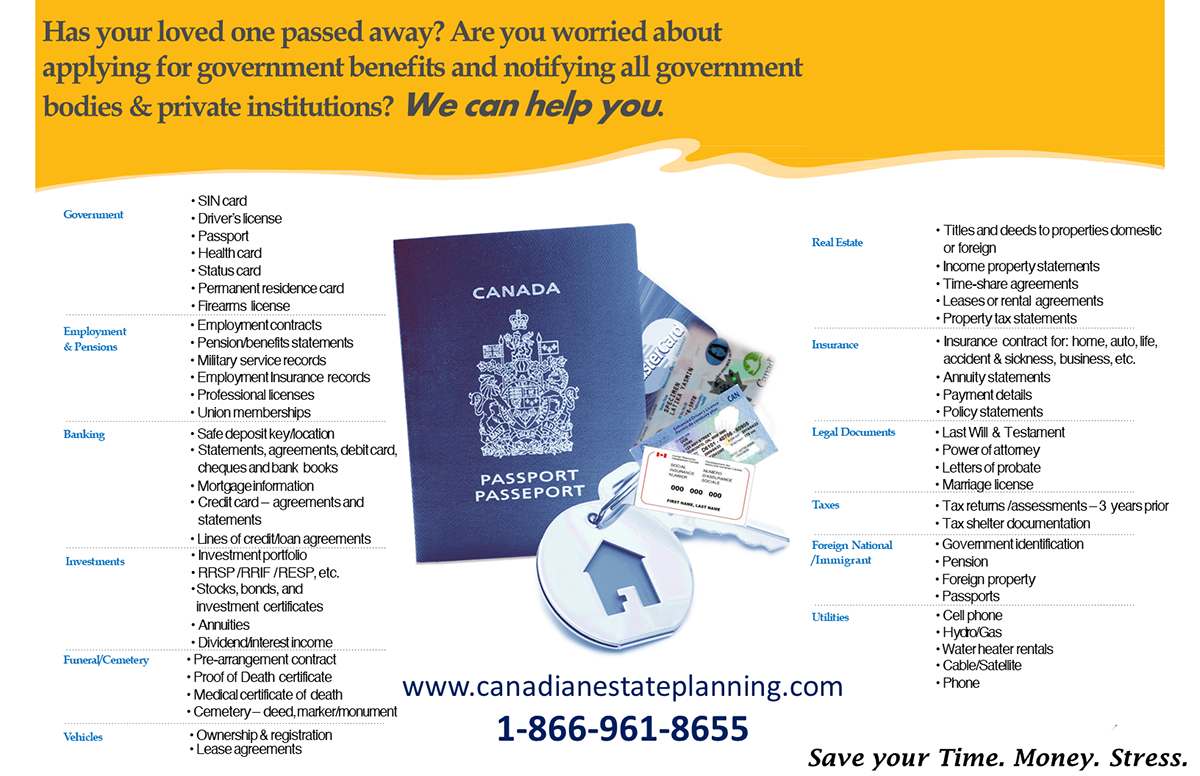NOTIFYING INSTITUTIONS AND GOVERNMENT AGENCIES
There are so many social connections you will need to notify of the death of a loved one. Just think of it: credit card companies, banks, investment and insurance companies, health care providers…the list can feel endless. What should be your top priority?
That’s simple. While the order of notifications you make will depend on your personal situation, it's essential that you stick to the following notification process and keep good records of all notifications you make. That should be your #1 priority.
For many of the government agencies and financial entities, you will need a certified copy of the death certificate, your loved one’s social insurance number (SIN) and, if you are the executor of the estate, a copy of the appointment form from the probate court.
All creditors should be notified promptly following a death. If there is to be a delay in meeting debts or installment payments, you may be able to file for extensions. Many creditors are sympathetic to these situations and are willing to grant your requests. If credit insurance or mortgage insurance policies were in force, purchases made on credit (vehicles, furniture, etc.) or the home mortgage may be paid off by the insurance. Ask your lending institution.
Also notify the major credit reporting agencies such as Equifax and TransUnion. Instruct them to list all accounts as: “Closed. Account Holder is Deceased.” You may also request a credit report to obtain a list of all creditors and to review recent credit activities.
Cancel Pensions and Benefits:
The Government of Canada website offers quick links to all departments.
Cancel Personal Identification
When your parent, spouse, common-law partner dies, you may be eligible for benefits:
Clubs, associations, and social groups also need to know. Did your loved one belong to any professional associations or unions? Even just your local video rental store should know as should the public library. Here’s a check list for you:
If not, you are faced with ferreting out your loved one’s many online accounts – and it could take some time. Here’s a brief overview of those digital realms you should monitor and eventually close:
That’s simple. While the order of notifications you make will depend on your personal situation, it's essential that you stick to the following notification process and keep good records of all notifications you make. That should be your #1 priority.
For many of the government agencies and financial entities, you will need a certified copy of the death certificate, your loved one’s social insurance number (SIN) and, if you are the executor of the estate, a copy of the appointment form from the probate court.
All creditors should be notified promptly following a death. If there is to be a delay in meeting debts or installment payments, you may be able to file for extensions. Many creditors are sympathetic to these situations and are willing to grant your requests. If credit insurance or mortgage insurance policies were in force, purchases made on credit (vehicles, furniture, etc.) or the home mortgage may be paid off by the insurance. Ask your lending institution.
Also notify the major credit reporting agencies such as Equifax and TransUnion. Instruct them to list all accounts as: “Closed. Account Holder is Deceased.” You may also request a credit report to obtain a list of all creditors and to review recent credit activities.
Cancel Pensions and Benefits:
- Old Age Security
- Canada Pension Plan
- Employment Insurance
- Canada Revenue Agency (GST/HST, child tax, etc.)
The Government of Canada website offers quick links to all departments.
Cancel Personal Identification
- Social Insurance Number (SIN)
- Passport
- Citizenship / Permanent Resident
- Secure Certificate of Indian Status
- Driver and vehicle licences
- Automobile ownership
- Health card
- Firearms licences
When your parent, spouse, common-law partner dies, you may be eligible for benefits:
- Survivor allowance
- Death benefit
- Survivor's pension
- International benefits
- Children's benefits
- Veteran's death benefit
- Aboriginal decedent estates program
Clubs, associations, and social groups also need to know. Did your loved one belong to any professional associations or unions? Even just your local video rental store should know as should the public library. Here’s a check list for you:
- Professional associations and unions
- Health clubs and athletic clubs
- Automobile clubs
- Video rental stores
- Public library
- College Alumni clubs
- Rotary, Kiwanis, Lions, Veterans’ organizations and clubs
If not, you are faced with ferreting out your loved one’s many online accounts – and it could take some time. Here’s a brief overview of those digital realms you should monitor and eventually close:
- Email accounts
- You Tube
- Blogging accounts
- Online banking or investment portals





